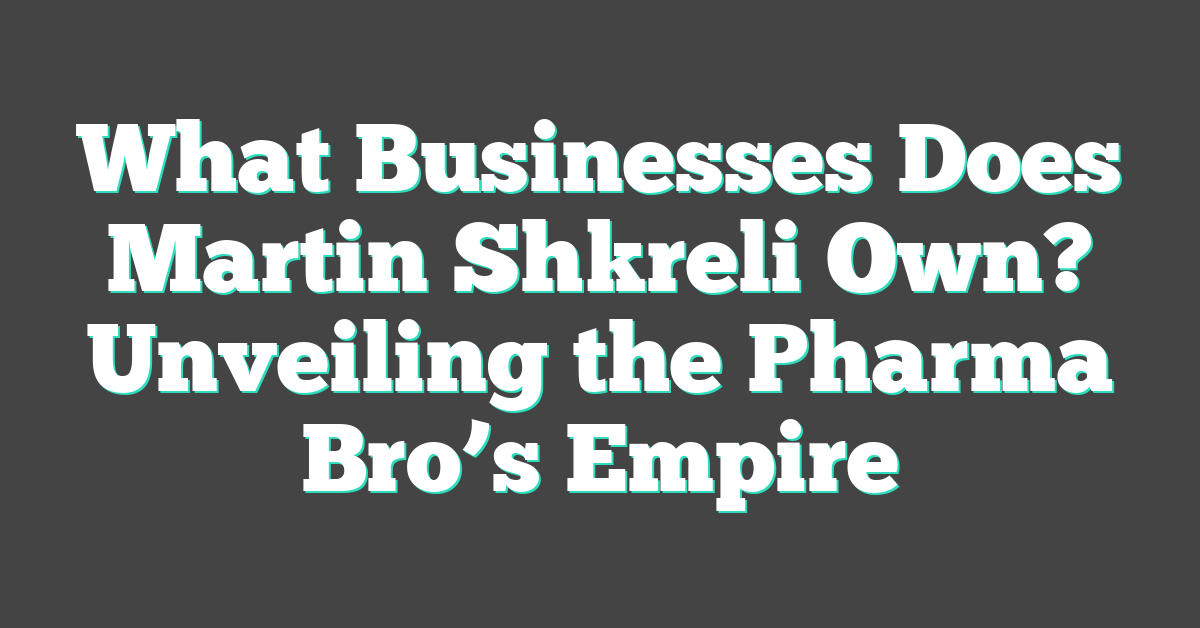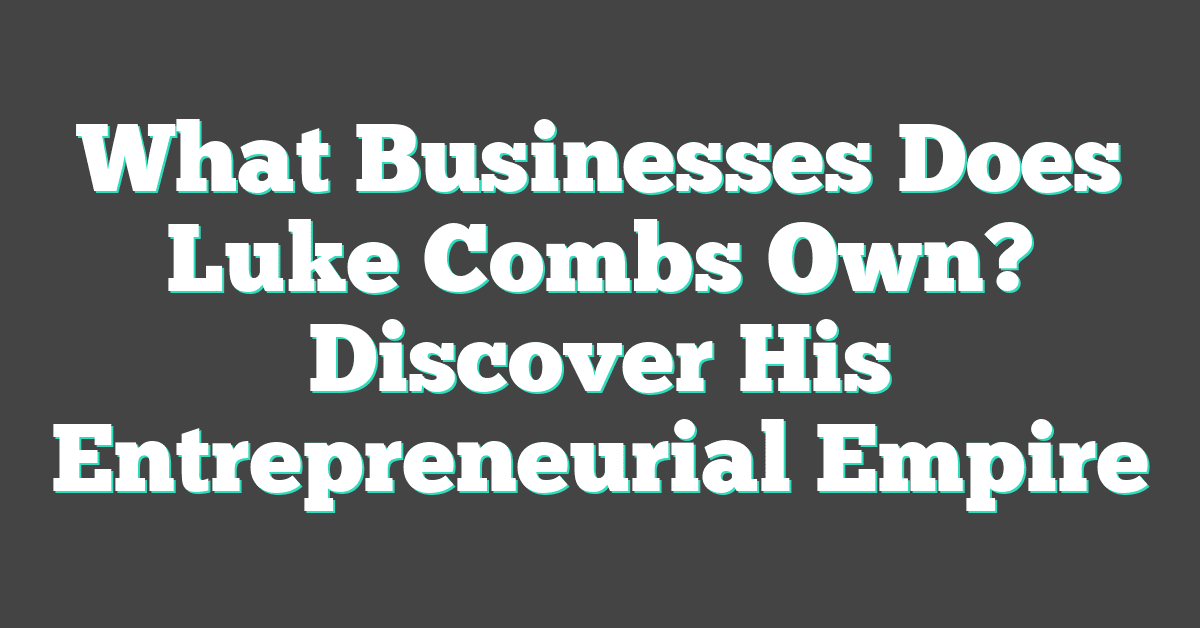Martin Shkreli, often dubbed “Pharma Bro,” has made headlines for his controversial moves in the pharmaceutical industry. But beyond the uproar and the Twitter antics, what’s the real scoop on the businesses he owns?

From founding his own company to his notorious price hike of a life-saving drug, Shkreli’s business ventures have been as talked about as his public persona. Let’s dive into the empire of Martin Shkreli and see what companies he’s had his hand in.
While his past actions have sparked outrage, they’ve also put a spotlight on his knack for business. It’s time to peel back the layers and explore the portfolio of one of the most infamous figures in the pharma world.
Shkreli’s Company: Turing Pharmaceuticals
Established in 2015 by Martin Shkreli, Turing Pharmaceuticals quickly became infamous for its aggressive business tactics. Shkreli’s approach to pharmaceuticals was far from subtle; he made no secret of his ambition to generate substantial profits. Turing, under his leadership, became synonymous with the kind of business maneuvers that attracted both media attention and public outrage.
At the heart of Turing Pharmaceuticals’ controversial fame was the acquisition of a drug named Daraprim. It had been on the market for decades, primarily used to treat a life-threatening parasitic infection. When Turing obtained the rights to Daraprim, they enacted an Astronomical Price Hike, raising the cost from approximately $13.50 per pill to an astonishing $750. This move sparked a national debate over drug pricing and pharmaceutical ethics.
While Shkreli flaunted the profitability of his actions, the healthcare community and patient advocacy groups lambasted Turing’s pricing strategy. They argued that it was exploitative and would restrict patient access to vital medications. Shkreli, however, maintained that the increased revenue was necessary to fund future research and development of new therapies.
Beyond Daraprim, Turing’s portfolio began to grow, though most of its developments and acquisitions remained overshadowed by the Daraprim controversy. They expanded into areas such as pediatric medicine and infectious diseases, aiming to fill niche markets with significant need. Despite the tumultuous reception, Shkreli’s company had carved out a distinct place in the pharmaceutical landscape, becoming a touchstone for discussions about drug pricing and the ethics of pharmaceutical business practices.
Shkreli’s Acquisition of Retrophin
Martin Shkreli, making waves as the so-called “Pharma Bro,” didn’t halt his ambitions with Turing Pharmaceuticals. He had his sights set on larger ventures, which led him to the acquisition of Retrophin. Founded in 2011, Retrophin had a focus on developing treatments for rare diseases, an area often overlooked by the larger pharmaceutical companies.
Under Shkreli’s leadership, the company sought to revamp old medications and repurpose them for the treatment of conditions such as nephrotic syndrome and focal segmental glomerulosclerosis. Retrophin represented an opportunity for Shkreli to delve into a sector ripe for innovation and high financial returns—elements that matched his business ethos.
« What Businesses Does Criss Angel Own? Explore His Magical Empire
What Businesses Does Sean Astin Own? Unveiling His Surprising Ventures »
Shkreli’s tenure at Retrophin, however, was not without its controversies. The company under his guidance pursued an aggressive strategy by acquiring old drugs and then increasing their prices, a move that later became his signature tactic at Turing. In his time with Retrophin, Shkreli was also involved in public disputes with employees and other management, which led to questioning of his unconventional leadership style.
Despite the controversies, Retrophin experienced significant growth and was a clear indication of Shkreli’s potent combination of business acumen and a penchant for risk. The company expanded its portfolio of drugs, and its value on the market surged, cementing Shkreli’s reputation as a bold player in the pharmaceutical industry. Retrophin’s aggressive approaches paved the way for what would later transpire at Turing Pharmaceuticals and throw the national spotlight on Shkreli.
The Controversial Price Hike of Daraprim
Martin Shkreli’s approach to pharmaceuticals took an audacious turn when he set his sights on Daraprim. Originally developed in the 1950s, Daraprim is an essential medication for treating toxoplasmosis, an infection that can be deadly for people with compromised immune systems, including those with HIV/AIDS. When Shkreli’s company, Turing Pharmaceuticals, purchased the rights to the drug, no one anticipated the shock waves that would ripple through the industry.
Overnight, Turing Pharmaceuticals implemented a staggering price increase. The cost for a single pill of Daraprim soared from $13.50 to $750. Critics decried the hike as exploitative, arguing that it put crucial medication out of reach for many patients. Shkreli defended the decision, insisting that the added revenue would fund valuable research for new treatments. He also pointed out that insurance and patient assistance programs would buffer the hike for most users, although this did little to quell the uproar.
Healthcare professionals and patient advocacy groups raised their voices in protest. The move sparked debate on a national scale about pharmaceutical regulations and the ethics of drug pricing. This was not just about one drug or one company — it was a question of industry-wide standards and practices. Could there be a reconciliation between the profit motives of pharmaceutical companies and the need for accessible, affordable medication?
Under intense scrutiny, Turing Pharmaceuticals later pledged to lower the cost for hospitals by up to 50% and promised smaller bottles to reduce the burden of upfront costs. Nevertheless, the damage to Shkreli’s public image was significant. His actions at Turing, much like his time at Retrophin, drew both condemnation and grudging respect for his unmatched chutzpah.
The debate over Daraprim’s pricing ignited a larger conversation, one that continues to echo in the halls of Congress, pharmaceutical boardrooms, and living rooms across America. Shkreli himself became something of a lightning rod for outrage and fascination, his every move watched closely by an audience that’s incensed, intrigued, or both.
Shkreli’s Other Ventures
Aside from his notorious escapades in the pharmaceutical world, Martin Shkreli also dipped his toes into various business pools. His interest in financial markets led him to establish his own hedge funds, including MSMB Capital Management and MSMB Healthcare. These ventures primarily focused on making strategic investments in the biotechnology sector, leveraging Shkreli’s experience and interest in pharma.
MSMB Capital Management, at its peak, boasted of impressive returns, leveraging Shkreli’s aggressive investment strategies. Yet, it was not without its controversies, including legal troubles that alleged financial mismanagement. The complexities of high finance seemed to follow Shkreli, as with his pharma dealings.
In addition to finance, Shkreli flirted with the tech industry by creating Godel Systems, a software company named after the mathematician Kurt Gödel. Godel Systems aimed to innovate the way people interact with software in the workplace but stayed relatively under the radar, never quite catching the public eye like Shkreli’s pharmaceutical endeavors.
Shkreli’s far-reaching interests also extended to the world of media and entertainment, which he pursued by buying a unique collectible – the Wu-Tang Clan’s one-of-a-kind album “Once Upon a Time in Shaolin.” Costing a reputed $2 million, the album purchase underscored Shkreli’s penchant for stirring both intrigue and criticism.
Lastly, Martin’s curiosity bloomed within the world of social media, where he maintained an active—and often provocative—presence. He utilized platforms like Twitter and YouTube to share opinions and engage with the public, until his controversial behavior led to his ban from several social networks.
Although Shkreli’s business ventures range widely across different industries, they’re unified by a common thread of bold moves and public scrutiny. These endeavors showcase a diversification of interests, yet each comes back to the spotlight that so often shines on Martin Shkreli—whether he’s courting controversy or driving innovative business ideas forward.
Conclusion
Martin Shkreli’s business ventures, from Retrophin to Turing Pharmaceuticals, have certainly made a mark on various industries. His approach to pharmaceuticals sparked a much-needed debate about drug pricing and industry ethics. While his tactics have been met with criticism, there’s no denying the impact they’ve had on the conversation around healthcare costs. Beyond pharma, Shkreli’s foray into finance and tech, as well as his more eclectic pursuits like the acquisition of a unique music album, show a man unafraid to explore and invest in diverse interests. His story serves as a complex tableau of ambition, controversy, and the power of public perception.
Frequently Asked Questions
Who is Martin Shkreli?
Martin Shkreli, known as “Pharma Bro,” is a controversial figure in the pharmaceutical industry known for his aggressive drug pricing strategies and his pivotal role in the price hike of the medication Daraprim.
What did Martin Shkreli do with Retrophin?
As the leader of Retrophin, Martin Shkreli pursued a strategy of acquiring old drugs and significantly raising their prices, foreshadowing his later actions at Turing Pharmaceuticals.
How much did the price of Daraprim increase?
The price of Daraprim increased from $13.50 to $750 per pill overnight under Turing Pharmaceuticals, which Martin Shkreli founded.
What was the public reaction to the Daraprim price hike?
The public reacted with outrage and debate, questioning the ethics of drug pricing and pharmaceutical regulations, ultimately tarnishing Martin Shkreli’s public image.
Did Turing Pharmaceuticals reduce the price of Daraprim after the hike?
Yes, Turing Pharmaceuticals pledged to lower the cost for hospitals and reduce upfront costs in response to the backlash, though the list price remained high.
What are some other ventures of Martin Shkreli?
Martin Shkreli’s other ventures include his hedge funds MSMB Capital Management and MSMB Healthcare, tech involvement with Godel Systems, and the purchase of a unique Wu-Tang Clan album.
What is the significance of Martin Shkreli’s social media presence?
Martin Shkreli’s social media presence has been notable for it often triggers public scrutiny and controversy, highlighting his broader impact and fascination beyond the pharmaceutical industry.











